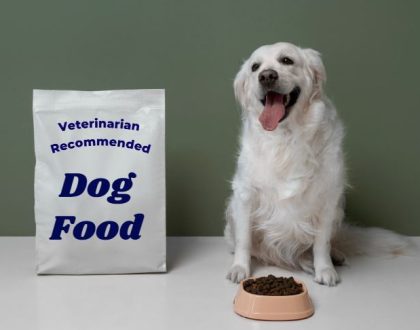
the scientific study of pet nutrition by veterinary nutrition specialists and experts.
Questions You Should Be Asking About Your Pet’s Food

As a veterinary nutritionist and someone who is passionate that pets get the best nutrition possible, it pains me to see owners standing in the pet store carefully reading ingredient lists. And this is all too common. In fact, our research studies have shown that most owners say that ingredients are the most important factor in selecting their pets’ food. The problem is that the ingredient list is one of the most useless aspects of the pet food label! While there are some regulations on the format of the ingredient list, it doesn’t tell us anything about the quality of the ingredients or if they’re in the right proportions. And the ingredient list is often used for marketing (Think those blueberries and artichokes are adding nutritional value to your pet’s food? Think again!)
Given the thousands of options for pet foods, it is confusing to separate the good ones from those that just advertise that they are good. Many owners turn to pet food rating websites to help. Unfortunately, these ratings are generally useless when it comes to helping pet owners to pick the best foods because they rank foods either on opinion (rather than scientific knowledge) or on criteria that don’t ensure a good quality food (including the ingredient list)
So, what’s the conscientious pet owner to do? Talking to your pet’s veterinarian should be the first step. Your veterinarian can help you select a food that meets your pet’s nutritional needs during different life stages, based on body condition and activity level, and if medical conditions should arise.
You can also rely on one very useful piece of information on the label – the nutritional adequacy statement.
However, there’s information that’s even more important – and that’s the quality and nutritional expertise of the company that makes the food. There is a very wide spectrum when it comes to the quality control and nutritional expertise of the many, many companies that currently manufacture pet food. And the ones with the best quality are not necessarily the ones that are the most expensive or who have the best marketing! To make it even harder, the information you need to sort this out is not on the label and requires a little (and sometimes a lot of) digging.
So how can you tell about the quality and nutritional expertise? Below are some questions savvy owners should ask companies to select the best possible food for their pets (modified from the World Small Animal Veterinary Association’s Nutrition Toolkit and Freeman et al. J Am Vet Med Assoc 2013).
- Does the manufacturer employ at least one full-time qualified nutritionist? This means a PhD in animal nutrition or board-certification (and, ideally, both) by the American College of Veterinary Nutrition or the European College of Veterinary Comparative Nutrition.
- What are the qualifications of the person who formulates their food (if it’s not the same person as their nutritionist)? This expert should have the same qualifications as in #1.
- Does the manufacturer own the plant(s) where their food is manufactured? Most small companies do not own their own plants which can reduce the control they have over quality.
- What quality control measures does the manufacturer practice? These vary widely among manufacturers but strict quality-control measures are critical to ensure safe, consistent, and nutritious food for your pet. Saying it’s the highest quality doesn’t make it true. Nor does having a statement on the label saying the food is complete and balanced. In fact, many of our studies have shown nutritional deficiencies in pet foods that claim on the label to be nutritionally complete and balanced (and the foods that had those deficiencies would not have met the standards detailed on this list). Examples of quality control measures the manufacturers should be using include certification of a manufacturer’s procedures (e.g., Global Food Safety Initiative, Hazard Analysis, and Critical Control Points, or American Feeding Industry Association); testing ingredients and end products for nutrient content, pathogens, and aflatoxins; materials risk assessments; and supplier audits.
- Are their foods tested with the Association of American Feed Control Officials (AAFCO) feeding trials? (this information also can be found on the label – find out how). If AAFCO feeding trials are not conducted, the manufacturer should at least ensure their diets meet AAFCO nutrient profiles through analysis of the finished product (rather than by predicting they meet the profiles based only on the recipe). This information can only be determined by asking the manufacturer.
- Does the company conduct any research? Do they publish it in peer-reviewed journals?
- Can the manufacturer provide you with the amount of any nutrient of interest (for example, sodium, protein, copper, or calcium)? They should be able to provide this information not just as guaranteed analysis numbers (which will be only minimums or maximums and are nearly useless), but as the average (or typical) analysis. This should ideally be provided on an energy basis (i.e., grams per 100 kilocalories or grams per 1,000 kilocalories), rather than on an as-fed or dry-matter percent basis, which does not account for the variation in energy density among foods.
- Can the manufacturer provide you with the number of calories for any of their foods on any requested weight or volume basis (for example, per cup, per can, or per kilogram)?
- Does the manufacturer bash other pet food companies (especially using information that is based on myths, rather than factual information) in their advertisements or on their websites?
If a manufacturer can’t (or won’t) give you all of this information (or doesn’t have good answers to your questions), this should be a red flag and you should be cautious about feeding that brand. There are good manufacturers out there, but also many that leave much to be desired in terms of quality control. A little digging can help you make a more objective decision on the best quality food for your beloved canine or feline family member.
Want to read more information on feeding your pet?
Subscribe to always know when we add new material!
Recommended Posts

Can Diet Help With My Dog’s Seizures?
January 18, 2024

The Most Popular Holiday Foods…That Your Pet Should Avoid!
December 08, 2023

Veterinarian Recommended Pet Foods: What You Need to Know
November 05, 2023

